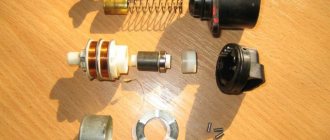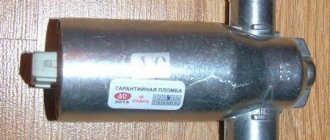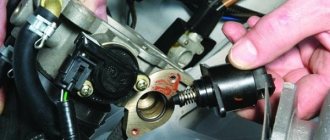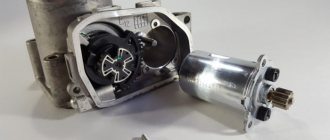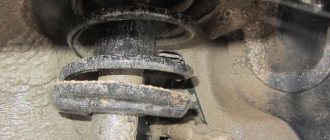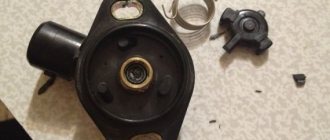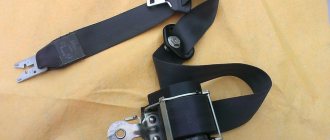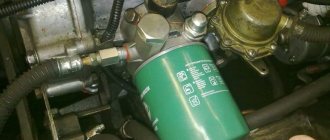The main reason for the unstable operation of the Lada Granta engine at idle is a malfunction of the regulator , throttle position sensor.
Note to the driver!
The Lada family, starting from the Priora, is equipped with an electronic throttle position control system. Previous models used a mechanical type of drive (cable).
Systematic use of equipment leads to wear and unstable operation. The process of self-prevention and replacement is simple, but requires attentiveness on the part of the master.
Using the example of a Lada Granta car, we will consider a step-by-step algorithm for replacing the idle speed sensor.
Signs of failure, need to replace IAC, TPS
- Difficulty starting the engine “cold” or “hot”;
- floating idle , unstable engine operation;
- increased fuel consumption;
- the accelerator pedal is uninformative;
- vibration in the car interior, vibration of the steering wheel;
- reduced acceleration dynamics;
- the car stalls when driving downhill;
- when you press the accelerator pedal, periodic dips and speed jumps are noticeable;
- increased consumption at idle.
Regulator replacement
In order to adjust the idle air regulator in carburetor-type cars, there are special screws that allow you to make the replacement manually. But you will need additional devices such as a tachometer and a gas analyzer. In general, the process of replacing the idle air control valve on these vehicles is characterized by a certain complexity.
But on new vehicles this procedure can be done much easier and faster. True, you will have to strictly follow some tips and recommendations:
- According to safety rules, all repair and diagnostic work is carried out only with the engine turned off.
- The four-pin connector must be disconnected.
- Then special contact bolts are unscrewed, after which the previous IAC is removed. Installing a working idle air control valve occurs in the reverse order.
- The bolts must be tightened well, since the idle air control regulator should not rattle.
- After installation, you can connect the connectors.
- Next, the sensor is calibrated. To do this, you need to turn on the ignition, but so that the engine itself does not start.
- Then, after calibration, you can operate the vehicle.
There is one small but important nuance that concerns the repair of the idle air control. It is simply not provided for. Some faults can be eliminated by treating the surface with special chemicals. For example, WD-40 or carburetor cleaner.
Causes of breakdowns of idle speed sensors
External air leakage is the first and main reason for unstable operation of the ignition system and fuel equipment. The electronic engine control unit (hereinafter referred to as the ECU), while scanning the readings, “does not know what to do with” the excess air.
The breakdown indicator lights up on the dashboard, the car speed fluctuates, and the air consumption increases.
The second most common reason is systematic jamming of the mechanisms in the ventilation valve. As a result, the tachometer needle shows speeds from 850 to 1250 rpm, and the idle speed is unstable.
Completes the “top three”: a lean mixture entering the cylinders for subsequent ignition.
Sensor
Preparatory stage before installing the idle speed sensor
Necessary tools, materials:
- screwdriver with magnetic tip;
- calipers;
- tester;
- stationery knife;
- torque wrench;
- idle speed controller (hereinafter referred to as IAC);
- throttle position sensor (hereinafter referred to as TPS);
- rags;
- additional lighting;
- liquid for removing deposits and rust WD-40.
Idle speed sensor on Lada Grante: where is it located and how to replace it
The main reason for the unstable operation of the Lada Granta engine at idle is a malfunction of the regulator , throttle position sensor.
Note to the driver!
The Lada family, starting from the Priora, is equipped with an electronic throttle position control system. Previous models used a mechanical type of drive (cable).
Systematic use of equipment leads to wear and unstable operation. The process of self-prevention and replacement is simple, but requires attentiveness on the part of the master.
Using the example of a Lada Granta car, we will consider a step-by-step algorithm for replacing the idle speed sensor.
Sequence of actions when independently replacing IAC and TPS sensors
- We place the machine on a level platform and ensure priority safety measures during repairs.
- We open the hood, an air duct with a receiver is laid above the engine. The Lada Granta with 8 and 16 valves has plastic, while in previous Lada models it is aluminum.
Air vent with receiver
- We press out the plastic clamp of the block with wires.
Plastic retainer
- Disconnect the contacts of the electronic gas pedal.
Electronic pedal contacts
- Using a Phillips screwdriver, unscrew the two screws securing the IAC to the throttle body.
- We remove the IAC from the cavity of the throttle assembly.
Removing the IAC
- Next, we proceed to unscrew the TPS, it is installed a few centimeters lower.
- We unscrew the two screws, remove the TPS, and disconnect the block with the wires.
Retrieving the TPS
Note to the driver! When removing the valve, be extremely careful not to lose the rubber bushing.
- We carry out troubleshooting of the seat of the IAC and TPS. We clean the rust deposits with a rag and use WD-40 aerosol as needed.
- Screw in each of the sensors one by one and connect the connectors with wires.
- We start the engine and check the idle speed.
of the idle speed sensor is complete.
Replacing the idle speed sensor
Principle of operation
The Grant idle speed sensor with 8 valves is located at the very bottom of the throttle assembly. This part is a rod that regulates the amount of air supplied to the fuel system. The IAC works according to the following principle:
- When the engine starts, the throttle valve is in the closed position.
- Information about this is sent to the engine ECU.
- The ECU sends a signal to the IAC.
- The IAC opens, sending air bypassing the throttle valve through the outlet channel.
- The ECU, receiving signals from the temperature sensor, adjusts the clearance of the IAC rod, thereby maintaining the required idle speed.
The sensor operates until the engine warms up to 80 degrees. After reaching the required temperature, or after pressing the gas pedal, the IAC switches off. After shutdown, the throttle assembly comes into operation, opening the throttle valve. The IAC is switched on again when the car is idle with the engine running, in neutral gear.
Equipment diagnostics
- We switch the tester to resistance testing mode (ohmmeter), measure the resistance at the regulator terminals according to the diagram: A - B, C - D. Data in the range from 0.040 to 0.080 Ohm.
- Using a caliper, measure the distance between the end of the needle and the flange; it should not exceed 23 mm.
Measuring the distance
- We inspect the mounting socket for each of the sensors, clean it with a rag from dirt and dust.
- Before installation, lubricate the O-ring with engine oil.
- We tighten the screws of the regulators with a torque of 3 - 4 Nm.
Main aspects of checking IAC
We figured out how to clean the idle speed sensor, now we’ll take the time to diagnose it. Like cleaning, testing can be done at home.
How to check the idle speed sensor:
- Find the IAC and remove it along with the wires. Unscrew several clamps that secure the throttle assembly with the receiver, then move these elements apart by about 1 cm.
- Using a diagnostic tester, check the IAC circuit - now you should make sure whether there is voltage in the network or not. Connect the tester probes to contacts A and D - as a rule, they are marked on the body. Having connected the probes, you need to activate the ignition and look at the results. The best option is 12 volts. If this parameter is lower, then most likely the problem lies in a poor battery charge, and if it is completely absent, then it is quite possible that the problem lies in the control unit.
- Make sure that the circuit is on the IAC itself. To do this, the tester's probes must be connected to pins A and B, and then to C and D, and you need to set the tester to ohmmeter mode. When checked, the diagnostic parameters should be about 53 ohms. Then the same actions should be repeated with other pairs of contacts, for example A and C, and the resistance should tend to infinity (the author of the video is Ivan Vasilyevich).
There is another option; for this, checking the idle speed sensor must be carried out with the IAC removed. Connect the power cable, then touch the end of the needle with your finger (no force required). During shutdown, the regulator should begin to extend the needle fully, so when you turn, there should be a slight push of the finger.
As you can see, in general, diagnosing a device is not that difficult, but for a quality test you need to understand how to use the tester. If you have no idea how to do this, it is better to seek help from an electrician, but in practice, after studying the instructions for the multimeter, there should be no problems with its use. Of course, the tester itself must be working, otherwise the readings will not correspond to reality and you will only get confused.
Addresses of companies providing installation/replacement services (Moscow, St. Petersburg, Kyiv region)
| № | Name | Address |
| 1. | "Oiler" | https://oiler.ua/ Kyiv, V. Lobanovsky Ave., 119D, Goloseevsky district |
| 2. | "AUTOKLONDAYK" | https://auto-vaz.com.ua/ TO AUTOKLONDAYK, Kyrylivska street, 60P, of. 1, Kyiv, 04080 |
| 3. | "Star - D" | https://star-d.ru/ st. Savushkina, 89, not far from the Staraya Derevnya metro station, 200 meters from the St. Petersburg - Finland highway (from Primorsky Prospekt). |
| 4. | "OSA" - Society for Assistance to Motorists" | Address: 190013, St. Petersburg, st. Vvedensky Canal, 7, BC “Farvater”, office 210 |
| 5. | "Auto Mechanic" | Address: Rostokinsky pr-d, 3с61 |
| 6. | "PaAlex" | Address: st. Ozernaya, 46k2s2 |
So why is this happening
Root causes of problems
The most common situations in which floating speeds occur:
- Cars with a built-in electronic fuel injection system suffer from such problems much more often than others. And this happens due to the constant suction of excess air, the volume of which still increases, which leads to the formation of a malfunction. The sensor responsible for gasoline injection simultaneously calculates the volume of air entering the cylinders. Based on these and some other indicators of the sensors, the electronic unit opens the electromagnetic injection valves for some time. It follows from this that when there is an excessive amount of air in them, the sensor, which is responsible for the position of the throttle valve, shows the driver that the task assigned to the system is impossible - the check light is on. During this, the temperature sensor indicates that the engine is exiting the warm-up mode. This indicates that it needs less fuel. Just at such a moment, floating speed appears in the car at idle, because the electronic unit does not understand what to do with the accumulated excess air in the system.
- This reason also partially relates to air suction and occurs mainly on 16-valve engines. The main place where air leaks still occur is the gluing contour of the receiver elements. Even minor damage to this area will lead to unstable operation of the motor.
- Constant jamming also easily becomes a reason for the occurrence of floating speed. It occurs in the crankcase ventilation valve. Therefore, if the reason is precisely this phenomenon, the systematic operation of the automatic power regulation sensor is disrupted. As a result, the same sensor signals instability of the engine. In a faulty state, the speed ranges from 1,300 to 900 per minute.
- In models with a carburetor engine, floating speed occurs due to a violation of the control of the servomotor. To correct this problem, simply unscrew the adjustment bolts in the area of the servomotor where the sensor points to the loose drive.
- Low pressure in the fuel system causes the same problems.
- Breakdowns in the ignition system are sometimes also classified as causes of floating speed. The problem is primarily related to high-voltage wires and spark plugs. But only with a visual inspection will it be possible to understand whether they are really the problem.
- A breakdown of the IAC (idle air regulator) causes floating speeds, because it is responsible for their initial stability. The element is inexpensive and can be replaced, so there may not be any significant problems with this.
- The electronic gas pedal has a lot of disadvantages, especially if tuning the car is only in the process, but the car is actively used. Floating speed is a fairly common occurrence in such a situation.
List of online stores providing goods (Moscow, St. Petersburg, Kyiv region)
| № | Name | Address |
| 1. | "Existential" | https://exist.ua/ |
| 2. | "Klondike" | https://autoklondayk.com.ua/ |
| 3. | "Major-auto" | https://www.major-auto.ru/ |
| 4. | "AvtoRus" | https://www.autorus.ru/ |
| 5. | "How much" | https://www.avtostore.spb.ru/ |
| 6. | "PulseCen" | https://spb.pulscen.ru/ |
How to identify the problem?
Malfunctions in the operation of the device are difficult to identify, because the VAZ idle speed sensor is not covered by the general monitoring system, and if there is a malfunction in its operation, the “Check-Engine” indicator light does not signal. But some characteristic symptoms suggest that the idle speed sensor is faulty, for example:
- unstable idle speed;
- when the gearshift lever is set to neutral, the engine stops involuntarily;
- The idle speed decreases noticeably when other devices (heater, headlights) are turned on;
- involuntary increase or decrease in speed, regardless of engine operating mode;
- When a cold engine starts, it becomes difficult to reach higher speeds.
There are several ways to check the idle speed sensor on a VAZ 2110.
Let's look at some of them.
- Checking the voltage going to the regulator. We put the car on the handbrake or install anti-roll bars to prevent it from rolling. Disconnect the sensor from the wire block. We check the presence of voltage with a conventional voltmeter: the negative probe is on the engine, the positive probe is on the terminals of the connecting block, wires A and D. Turn on the ignition and analyze the measurements obtained. The operating voltage must be at least 12 V. If it is less, there may be a problem with the battery charge. If there is no voltage (open circuit), we check the electronic control unit and the entire circuit.
- Measuring circuit resistance. We analyze terminals A and B, C and D one by one - a working sensor will produce 53 Ohms. We measure Ohms in pairs B and C, A and D - the resistance if the IAC operates correctly will be infinitely high.
Review of prices from different manufacturers
| Manufacturer article number | Price, rub.) | Resource (Thousand km) |
| Idle speed regulator 2190 KZTA1148300-02 | From 695 | 85 – 95 |
| 2190-1148300-03 | From 700 | —/— |
| Throttle position sensor 2190 VTN 05435435 | From 250 | 65 – 75 |
| Omega 465656 | —/— | —/— |
| Ricor Electronics | —/— | —/— |
| KRAFT NEW | —/— | —/— |
*prices are current as of November 3, 2018.
The procedure for replacing the IAC on a VAZ 2114 engine
Before replacing the idle speed control of the VAZ 2114, you need to prepare the sensor, the necessary tools and materials:
- As a replacement device, you can buy an IAC marked 2112-1148300-04 “KZTA” or “omega” 2112-114830. When choosing, be sure to check the exit of the needle rod to a distance of no more than 23 mm;
- for work you need a Phillips-head screwdriver, as well as a key “13”;
- Be sure to have rags, WD-40 and carburetor cleaner ready.
Before replacing the device, you must:
- Place the car on a level surface and put the handbrake on.
- Raise the hood and lock it in the open position.
- Disconnect the battery; when replacing the IAC, this is not a requirement, but a mandatory condition.
- Remove the cover, which is the protective casing of the engine.
- After loosening the clamp, disconnect the rubber tube from the air filter pipe, otherwise it will interfere with the disconnection of the pipe itself.
- Unscrew the clamp securing the VF pipe, disconnect and move the pipe corrugation to the side.
- Loosen the fastening screw and pull out the cable running from the gas pedal to the throttle valve.
- Using a rag, clean the surface of the throttle body and around it.
- Lubricate the remote control mounting nuts and IAC mounting screws with WD-40 to make them unscrew better.
- Unscrew the two nuts to “13” and remove the entire throttle assembly.
- Disconnect the IAC connector by removing it from the sensor terminals.
- If there is dirt in the places where the IAC is attached and adjacent to the remote control housing, it must be removed by thoroughly wiping everything with a prepared rag.
- Using a Phillips screwdriver, unscrew the two screws that secure the IAC to the remote control.
- Remove the valve from the mounting socket.
- It is advisable to wash the throttle assembly with carburetor cleaner.
- Install the regulator prepared for replacement on the throttle assembly in the same position in which the device was just removed.
The rubber gasket, which should be sold together with the sensor, must be pre-lubricated with engine oil.
- Tighten the two screws and make sure that the IAC is tightly attached to the remote control housing.
- Place the throttle assembly in place and make sure the mounting nuts are tightly tightened.
- Connect the connector to the valve terminals.
- Attach the cable to the throttle valve and connect the VF pipe and the rubber tube, tightening the clamps.
- Install the protective cover on the engine.
- After installation, the IAC must be calibrated. To do this, connect the battery terminals and turn on the ignition for ten seconds. The ECU will calibrate itself. After this, the IAC is ready for operation.
Recommendations for choosing components
Insufficient driver experience and a wide range of spare parts are the main factors that make it difficult to select and purchase components for the Lada Granta.
Cheapness is the first sign of low quality workmanship.
When purchasing, carefully check the catalog items and search indexes with the actual data specified in the operating instructions. If you do not have experience in servicing equipment, use the services of certified service stations and demand a quality guarantee for the work performed.
Absolute pressure and air temperature sensors Lada Granta
These sensors are combined into one housing and installed on the receivers of the intake module; the most modern AvtoVAZ engines are equipped with them.
DBP on Grant differs in the output signal voltage within the range of 0.15..4.6 V, this voltage depends on the pressure level inside the intake pipe. The information it sends helps the ECU calculate the amount of air received by the intake pipe during one cycle.
A breakdown of the device circuit leads to an error code being entered into the system memory, and then the alarm turns on. After this, the control system calculates the air received based on the crankshaft speed, as well as based on the throttle valve opening angle.
The sensitive component of the DTV is the inlet pipe thermistor. The output signal voltage of the device connected to the computer will be approximately 0.3..4.9 V, it depends on the temperature of the air passing through the specified element. When a DTV failure is detected, the control system performs actions similar to its actions in the event of a DBP failure on a Lada Granta, replacing the readings of the described device with fixed temperature values.
Reviews
| № | Positive |
| 1. | Vasily: I’ve been driving a car for a year and a half, I haven’t made any capital investments, except for the purchase of consumables. I regularly maintain it, buy good oils, and fill it with high-octane fuel. |
| 2. | Gennady: at 30,000 km I cleaned the idle air regulator once, and since then I forgot about the malfunctions. In winter, the car starts with a half turn. |
| 3. | Ivan: I recently went to a service station, the car started to be difficult to start. After diagnostics, the technician discovered poor contact between the block and the wires on the throttle position sensor. Now the Lada Granta works like a watch. |
| 4. | Vladlen: I have no complaints about the quality of the machine, because it is a budget option. Yes, breakdowns do occur, but they are minor and can be repaired independently. |
| 5. | Gennady: a year has passed since the purchase of the equipment, there are no comments. I tighten the fastenings in small ways, check the wiring, otherwise no comments. |
| 6. | Dmitry: for two years of operation of the car there were no major breakdowns, minor ones were fixed independently, and I did not contact the service center. |
| 7. | Valery: I am satisfied with the quality of workmanship and assembly of the machine. After the purchase, I immediately tightened all the fasteners, the interior is quiet, the plastic does not make noise. |
| Negative | |
| 8. | Victor: the first time the regulator flew 40,000 km, I contacted the service center and had it replaced. At 65,000 km the TPS began to act up. I decided to sell the car and will buy a Renault Logan. |
| 9. | Georgy: after a year of operation, the car began to crumble, I visited the service station twice unscheduled. I am dissatisfied with the quality of workmanship and assembly and plan to sell the car. |
| 10. | Vladislav: I used the car actively for six months, it started to fall apart, I had it repaired twice under warranty. I do not recommend Lada Granta for purchase. |
Features of the Lada Granta throttle assembly
The throttle valve is turned by an electric motor through a gearbox. Both are built into the throttle body.
When starting and warming up the engine, as well as during idling, the flow of air into the cylinders is regulated by opening the throttle valve.
The throttle position is controlled by two sensors built into the throttle body.
The throttle valve opening angle is set by the electronic control unit (ECU) depending on the estimated amount of air that should enter the engine cylinders. This takes into account the operating mode of the engine (starting, warming up, idling, and so on), the temperature of the ambient air and the engine, and the position of the gas pedal.
Control commands are sent to the throttle assembly to the electric motor. At the same time, the ECU monitors the opening angle of the damper and, if necessary, sends appropriate commands to adjust its position. As a result of the fact that the ECU simultaneously regulates the amount of injected fuel and incoming air, the optimal composition of the combustible mixture is maintained in any engine operating mode.
The electric throttle body is sensitive to deposits that may accumulate on its inner surface. The resulting layer of deposits can interfere with the smooth movement of the throttle valve, jamming it (especially at low opening angles). As a result, the engine will operate unstably and even stall at idle, start poorly, and failures may also appear during transient conditions. To avoid this, as a preventive measure, deposits should be removed with special detergent compounds during regular vehicle maintenance. A large layer of deposits can completely block the movement of the damper. If flushing fails to restore the throttle assembly to operability, it must be replaced.
A malfunction or incorrect operation of the throttle assembly may be caused by a broken contact in its electrical circuit (oxidized terminals in the wiring harness connection block). In this case, it will be possible to restore operation by treating the terminals with a special compound for cleaning and protecting electrical contacts. There are other possible causes of the malfunction:
— no supply voltage is supplied to the throttle assembly;
— signals are not received from both throttle position sensors;
— The computer cannot recognize signals from the throttle position sensors.
In these cases, the engine control system goes into emergency mode. At the same time, the car retains the ability to independently move a short distance at a slow speed, which, in extreme cases, will allow it to be moved to a safe place (pull to the side of the road, leave an intersection, etc.).
The fact that the throttle assembly is operating in emergency mode may be indicated by a burning indicator lamp for a malfunction of the engine management system and an increased speed of the crankshaft at idle (about 1500 min-1, despite the fact that the engine is warmed up to operating temperature). it will not respond to pressing the gas pedal.
Each of the throttle position sensors is a potentiometer. During operation, gradual wear of conductive paths and moving contacts occurs. Over time, wear can reach such an extent that the sensor cannot function correctly. The presence of two sensors increases the reliability of the entire unit.
If only one sensor fails, the warning lamp will light up, but the engine management system will switch to backup mode. In this case, the engine will respond adequately to pressing the gas pedal, but with worse performance parameters
The reserve mode allows you to drive your car to the repair site under your own power.
Conclusion
The performance of idle speed sensors is influenced by many factors, including:
- fuel quality;
- level of dust and gas contamination of the territory;
- filter replacement frequency;
- car driving style.
In most cases, breakdowns are caused by violation of the operating conditions of the technical equipment by the driver. Purchasing cheap, non-original spare parts and unprofessional installation are the main factors that create the preconditions for premature wear of parts.
Functional features
The main purpose of the sensor discussed here in Lada Kalina is to measure the main parameters in the intake system and adjust the speed. This is done by sending pulses to the engine control module, which, based on the data received, adjusts the volume of injected fuel.
Due to the fact that the specified idle speed regulator acts as an actuator, determining its failure is a very difficult task. This is due to the lack of a useful self-diagnosis function in the Lada Kalina.
The device is designed to control the volumes of air that are directed through the intake tract into the combustion chambers of the engine. Here, the air mass (also measured by the mass air flow sensor) enters through a special channel, bypassing the throttle valve, which is closed in idle speed mode.
This idle speed regulator is involved in warming up the 8-valve engine, ensuring that the unit reaches its operating temperature in a timely manner.
When the ignition is turned on, a rod “crawls out” from the regulator and reaches a specially designed hole. This is called the initial position of the sensor.
Next, we outline the primary functions of this device:
- adjusting the optimal air mass;
- participation in warming up the engine 8 valves;
- determination and adjustment of the number of revolutions.
Preventive measures
In order not to encounter a complete malfunction of the regulator in the future, it is worth periodically carrying out the cleaning process described above. How often to carry out the cleaning process depends on how actively you use your vehicle. If the car is a work vehicle, it is recommended to check and clean the sensor once a year; if you use it only for yourself, once every two years will be enough. But, of course, do not forget about the signs of a part malfunction; if they appear, do not delay. This will help you avoid complete failure of the part and enjoy a quality ride.
Together with you, we come to the conclusion that the part is unpretentious, simple in its functionality and use. Don’t forget: timely detection of a malfunction is the key to overall vehicle productivity. The full operation of the engine depends on the serviceability of each of its components, and if you neglect any part, including the idle speed sensor, this can lead to more labor-intensive repair processes and failure of the entire car.
